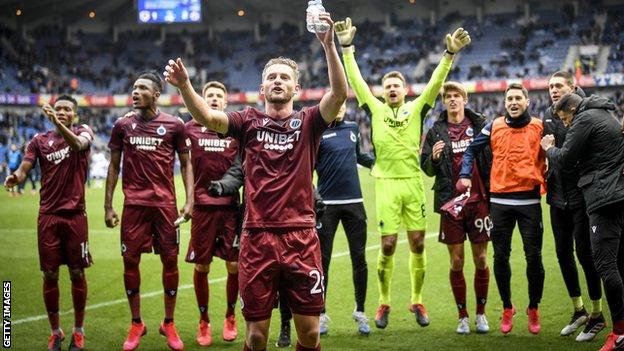Uefa's European warning: the key questions for Scottish clubs
- Published

Club Brugge are poised to be confirmed as the Belgian Pro League champions
Belgium have resolved to 'call' their top division now and abandon any attempt to conclude the campaign.
So piqued were Uefa by this, that they sent a letter to the 55 national associations in Europe saying that any such attempts to do so could risk countries forfeiting Champions League and Europa League places for next season.
But just what is going on? What are the key factors in this? And how does it affect Scotland?
Why have Uefa sent out this letter?
Basically, because of the Belgians. On Thursday, the Pro League's board of directors decided to declare the current league table as final.
With one game of the regular season - plus play-off matches - remaining, Club Bruges will be crowned champions in a ruling that will be ratified on 15 April. The relegation issue is as yet unresolved.
While the Uefa letter did not explicitly mention Belgium, it did leave little room for doubt when it said "any decision of abandoning domestic competitions is, at this stage, premature and not justified".
What are the key points they are making?
Uefa talk about the importance of "reacting as one united family" and say it is "of paramount importance" that the pandemic does not stop competitions being decided on the pitch.
They say two working groups have been set up to look at the "calendar options" and the "legal, regulatory and financial consequences" of the current campaign going beyond the end of June.
The work of these is now focused on how football might - not will, but might - be played in July and August. They intend to have a verdict on that by mid-May. They reiterate that "stopping competitions should really be the last resort" once these options have been exhausted.
Uefa conclude by warning that they "reserve the right to assess the entitlement of clubs" to play in European competitions next term if seasons are prematurely halted.
Why are they so determined to finish seasons?
Two main reasons. One, they want leagues to finish at the same time, then start again at the same time so transfer windows are not thrown out of kilter.
Secondly, they fear that ending domestic campaigns could threaten the remainder of the Champions League and Europa League. How could those knockout ties - including the second leg of Rangers' Europa last-16 meeting with Bayer Leverkusen - be played without the clubs having resumed their league games?
And if the European competitions had to be declared null and void, Uefa could potentially face huge financial claims from broadcasters around the continent.
Is this all about money, then?
It's undeniably a significant part of it. The big-five leagues - England, Spain, Germany, Italy and France - all have eye-watering television and sponsorship deals, which they fear could be invalidated should seasons not finish.
Indeed, French broadcaster Canal Plus has refused to pay the next £100m instalment of their rights deal.
Smaller leagues have less to lose, with the Belgian Pro League reportedly in receipt of all payments and confident that there is no contractual clause that might lead to a claim.
What has been the reaction in Scotland?
The letter is being interpreted by some senior figures in the Scottish game as a "veiled threat", given the warning about not being able to take up place in European competitions.
There had been a growing sense that a resolution to the domestic season was not far away, but Uefa's interjection may well affect that. Would clubs - particularly Celtic and Rangers - be prepare to risk losing European football and the revenue that would bring?
So, when might we get some football here?
Some prominent voices in the Scottish game have suggested a return to training in late June, with a view to matches beginning again at the start of August. Indeed, German clubs Borussia Dortmund, Bayer Leverskusen and Eintracht Frankfurt have began allowing players to work together in groups of two or three.
But would that August return be a resumption of this Scottish season? Or the start of a new one? Uefa's letter has left that shrouded in doubt.
The reality is that football people don't know when they will be able to play again. That is the domain of medical experts and governments and governing bodies have to adhere to their guidelines.
What happens next, then?
The Belgian Pro League have since said they have received assurances from Uefa that they would not force leagues to continue.
And there have been reports that Uefa vice-president, Michele Uva, has said clubs could be admitted to European competition next term even if they abandon their current seasons. But that abandonment would have to be on the back of a government decree.
So what happens next? We're still not all that much clearer in this ever-evolving story.